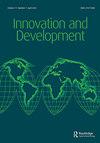谁从创新政策中受益?企业在获得公共创新资金方面的能力
IF 1.7
Q3 DEVELOPMENT STUDIES
引用次数: 1
摘要
摘要本文的目的是研究企业能力在其从公共创新资金中获益的作用。文献一致认为,能力在政策获取中起着关键作用,但这种关系尚未得到具体探讨。理论框架将企业能力的演化方法与创新政策文献相结合。实证策略基于国家就业和创新动态调查,这是一项企业层面的cis型调查。这包括关于获得主要阿根廷技术基金的数据。结果表明,生产能力、创新能力和连接能力会影响人们了解和访问FONTAR的可能性,尤其是企业的生产能力和连接能力。结果还表明,创新企业比非创新企业了解和使用FONTAR的概率更高。这提供了证据,表明有必要考虑将公共资金用于创新,并与其他公司层面的政策相结合。本文章由计算机程序翻译,如有差异,请以英文原文为准。
Who benefits from innovation policy? The role of firms’ capabilities in accessing public innovation funding
ABSTRACT The objective of this paper is to study the role of firms’ capabilities in their benefiting from public funds for innovation. The literature agrees that capabilities play a key role in policy access, but this relationship has not been specifically explored. The theoretical framework combines the evolutionary approach to firms’ capabilities with the literature on innovation policy. The empirical strategy is based on the National Employment and Innovation Dynamics Survey, a CIS-type survey at the firm level. This includes data about access to the main Argentine Technological Fund (FONTAR). Results show that productive, innovation, and connectivity capabilities impact the probability of knowing about and accessing FONTAR, especially firms’ productive and connectivity skills. Results also show that innovator firms have higher probabilities of knowing about and accessing FONTAR than non-innovator ones. This provides evidence about the need to think of the public funding of innovation articulated with other firm-level policies.
求助全文
通过发布文献求助,成功后即可免费获取论文全文。
去求助
来源期刊

Innovation and Development
Social Sciences-Cultural Studies
CiteScore
3.70
自引率
0.00%
发文量
24
期刊介绍:
conomic development and growth depend as much on social innovations as on technological advances. However, the discourse has often been confined to technological innovations in the industrial sector, with insufficient attention being paid to institutional and organisational change and to the informal sector which in some countries in the South plays a significant role. Innovation and Development is an interdisciplinary journal that adopts a broad approach to the study of innovation, in all sectors of the economy and sections of society, furthering understanding of the multidimensional process of innovation and development. It provides a forum for the discussion of issues pertaining to innovation, development and their interaction, both in the developed and developing world, with the aim of encouraging sustainable and inclusive growth. The journal encourages articles that approach the problem broadly in line with innovation system perspective focusing on the evolutionary and institutional structure of innovation and development. This focus cuts across the disciplines of Economics, Sociology, Political Science, Science and Technology Policy, Geography and Development Practice. In a section entitled Innovation in Practice, the journal includes short reports on innovative experiments with proven development impact with a view to encouraging scholars to undertake systematic inquiries on such experiments. Brief abstracts of degree awarded PhD theses in the broad area of concern for the journal and brief notes which highlight innovative ways of using internet resources and new databases or software are also published.
 求助内容:
求助内容: 应助结果提醒方式:
应助结果提醒方式:


